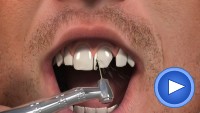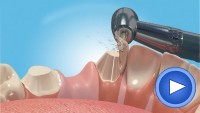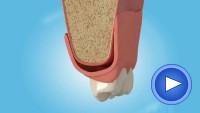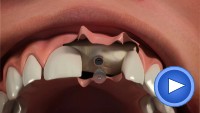Crowns
A crown is a type of dental restoration used to fix teeth that have been broken, weakened by decay or have a very large filling. The crown fits over the remaining part of a prepared tooth, making it strong and giving it the shape of a natural tooth. It can also be tooth coloured, giving the restoration a more natural appearance so it fits in with the rest of your teeth.
A crown could be a good solution for you if you have some discoloured fillings and would like to improve their appearance. Crowns can be used to replace these to give you a more aesthetic smile. Also, if you have had root canal treatment you will need a crown to protect the restored tooth, allowing you to eat and bite down on it as if it was a real tooth.
Bridges
If you require a more extensive restoration than a crown or have more than one tooth that needs to be replaced, a good solution is a bridge. Bridges are usually made of a precious metal base which gives them a solid structure and makes them hard-wearing. If you need a bridge in your smile line, porcelain is usually added to the base to make it look more like real teeth. A bridge helps to strengthen the prepared teeth and makes chewing and eating easier because they are fixed and can’t come out.
Some bridges can also be fixed to your jaw with dental implants.
Once you have a bridge fitted, you will have to take extra care of your daily hygiene regime to ensure it stays plaque free.
Dentures
If you have a few or all of your teeth missing, one solution is to have a denture. A denture is made from hard-wearing material that mimics the look of teeth and gums to give your mouth a natural appearance. Your denture will be made to fit snugly on your gums and you will be able to remove it for cleaning.
When you wear a denture for the first time it may get some getting used to when speaking, eating and chewing. It is important that you take extra care in your hygiene regime so that you can avoid bad breath, tooth decay and gum disease.
Denture Stabilisation
If you have loose or ill-fitting dentures, your ability to eat and speak may become affected. Due to advances in dentistry, there is now a procedure whereby your denture can be fixed to your jaw with dental implants. This treatment, known as implant overdentures or denture stabilisation, offers patients with dentures a more permanent solution and can improve your quality of life significantly. You will be able to enjoy your favourite foods again and feel comfortable smiling, safe in the knowledge that your dentures are staying put.
As part of this treatment, you will require surgery to have the implants placed into your jaw. Once they have integrated with the bone and surrounding tissues for a period of time, your dentures are placed on top of the implants through a range of special fixtures. This means your dentures can still be removed for cleaning, but will stay put once in place.
Some of the other benefits that you will enjoy with this type of treatment are a natural looking smile, improved confidence, less irritation of your gums.
Dental Implants
Have you lost all or some of your natural teeth? Bridges, dentures and flexible dentures are not the only solution, thanks to advances in modern dentistry. Dental implants are small metal screws that are placed in the jaw so that crowns, bridges and dentures can be fixed onto them.
Implant dentistry offers a clinically proven and safe solution to getting back a great smile and being able to bite and chew with confidence. When you lose your natural teeth, your jaw bone and surrounding tissues start to resorb or disappear over time. When implants are placed in the jaw, it stimulates the remaining bone to grow and mesh around the metal, along with tiny blood vessels. More importantly, implants help restore function so you can eat, chew and bite without your dentures falling out or having to stick to a soft food diet for the rest of your life.




